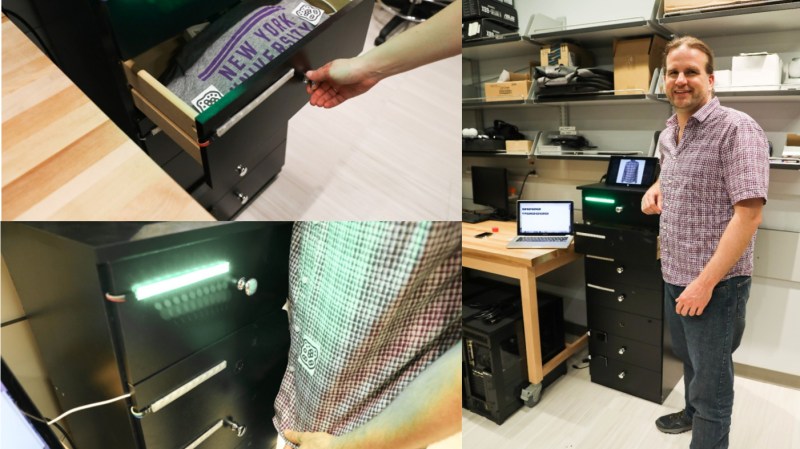People with dementia have trouble with some of the things we take for granted, including dressing themselves. It can be a remarkably difficult task involving skills like balance, pattern recognition inside of other patterns, ordering, gross motor skill, and dexterity to name a few. Just because something is common, doesn’t mean it is easy. The good folks at NYU Rory Meyers College of Nursing, Arizona State University, and MGH Institute of Health Professions talked with a caregiver focus group to find a way for patients to regain their privacy and replace frustration with independence.
Although this is in the context of medical assistance, this represents one of the ways we can offload cognition or judgment to computers. The system works by detecting movement when someone approaches the dresser with five drawers. Vocal directions and green lights on the top drawer light up when it is time to open the drawer and don the clothing inside. Once the system detects the article is being worn appropriately, the next drawer’s light comes one. A camera seeks a matrix code on each piece of clothing, and if it times out, a caregiver is notified. There is no need for an internet connection, nor should one be given.
Currently, the system has a good track record with identifying the clothing, but it is not proficient at detecting when it is worn correctly, which could lead to frustrating false alarms. Matrix codes seemed like a logical choice since they could adhere to any article of clothing and get washed repeatedly but there has to be a more reliable way. Perhaps IR reflective threads could be sewn into clothing with varying stitch lengths, so the inside and outside patterns are inverted to detect when clothing is inside-out. Perhaps a combination of IR reflective and absorbing material could make large codes without being visible to the human eye. How would you make a machine-washable, machine-readable visual code?
Helping people with dementia is not easy but we are not afraid to start, like this music player. If matrix codes and barcodes get you moving, check out this hacked scrap-store barcode scanner.
Thank you, [Qes] for the tip.
















The worst thing that can happen with this set is when patient decides to recreate goatse (past memories, eye opening expirience) instead of dressing up.
Indeed. The only probem of dementia isn’t that the person can’t remember specific things, but that they can’t even remember that they can’t remember – their thought patterns get gradually distorted and confusion sets in to the point that a technological solution fails because the person no longer understands the situation they’re in.
It’s a problem of the person’s behaviour gradually deteriorating from the present towards the past, so if they learned the use of computers 10 years ago, soon they will not understand what the blinking lights are for, and take the vocal instructions from the computer the voice of the devil because they can’t explain it.
Some people with dementia run around in the nude because it is fun, and they no longer care what you think. Why would they care what a machine tells them to do?
Exactly. I know of a case where an ethnically Russian granny was hospitalized due to dementia, and all she would say was “kak”.
The nurses took that to mean she needs to use the bathroom, when in reality she was simply addressing them in her mother tongue asking “What?” – she had lost the use of language and reverted back to her own. How can you teach such a person to follow some blinking lights, and a voice in a language they don’t comprehend anymore?
You could go for universal underlying behaviours and use those to your advantage. Green is good because of leaves, trees etc. but red is bad because it’s often poisonous. Mark the thing to open using green LEDs and everything else with red.
Basically design the system for a chimp or another animal that doesn’t have language.
But green is always poison, red is health, and blue is mana.
Joking aside, maybe something like smiley-face emotes would translate better than colors.
“Some people”
There’s a big area between “can’t do it themselves” and “can’t follow any instructions” – just because it doesn’t solve *every* problem for *every* sufferer doesn’t mean it’s worthless.
As a caregiver and someone who’s seen multiple cases of dementia I can tell you that it is fairly worthless. The first thing you need to understand about patients with dementia is that they cannot learn anything new…. at all…. end of story. Even those rare cases where a person can learn about the new device you’ve given them, they will randomly forget how it works and most likely forget that you ever taught them. The second thing you need to understand is that every single case of dementia is completely different with different stages of progression and symptoms. So this method might work for one or two cases but the more sophisticated it is, the more it becomes tailored to those one or two cases, making it worthless for everyone else.
Garanimals++